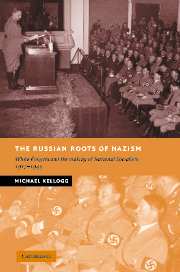Book contents
- Frontmatter
- Contents
- Acknowledgments
- List of abbreviations
- Introduction
- 1 The far right in the German and Russian Empires
- 2 At the extreme in the Ukraine and in Germany
- 3 “Hand in hand with Germany”
- 4 The international radical right's Aufbau (reconstruction)
- 5 “Germany–Russia above everything”
- 6 Conspiracies of fire and the sword
- 7 “In Quick March to the Abyss!”
- 8 The four writers of the apocalypse
- 9 Aufbau's legacy to National Socialism
- Conclusion
- Bibliography
- Index
- NEW STUDIES IN EUROPEAN HISTORY
- Frontmatter
- Contents
- Acknowledgments
- List of abbreviations
- Introduction
- 1 The far right in the German and Russian Empires
- 2 At the extreme in the Ukraine and in Germany
- 3 “Hand in hand with Germany”
- 4 The international radical right's Aufbau (reconstruction)
- 5 “Germany–Russia above everything”
- 6 Conspiracies of fire and the sword
- 7 “In Quick March to the Abyss!”
- 8 The four writers of the apocalypse
- 9 Aufbau's legacy to National Socialism
- Conclusion
- Bibliography
- Index
- NEW STUDIES IN EUROPEAN HISTORY
Summary
In the aftermath of the Russian Revolution of October 1917, anti-Bolshevik exiles from the former Russian Empire, known as “White émigrés,” contributed extensively to the making of German National Socialism. This book examines the formative political, financial, military, and ideological influences that White émigrés exerted on Adolf Hitler's National Socialist movement. This study of White émigré contributions to Hitlerism demonstrates that National Socialism did not develop merely as a peculiarly German phenomenon. National Socialism arose in the early post-World War I period (1918–1923) from an international radical right milieu in which embittered völkisch (nationalist/racist) Germans collaborated with vengeful White émigrés in an anti-Entente (Britain and France), anti-Weimar Republic, anti-Bolshevik, and anti-Semitic struggle.
From 1920 to 1923, Hitler allied himself with a conspiratorial völkisch German/White émigré association headquartered in Munich, Aufbau: Wirtschafts-politische Vereinigung für den Osten (Reconstruction: Economic-Political Organization for the East), hereafter Aufbau. This secretive union sought to combat international Jewry and to overthrow both the German Weimar Republic and the Soviet Union in league with National Socialists. Aufbau contributed considerable sums of money to Hitler's National Socialist movement. Moreover, early National Socialist ideology combined völkisch notions of Germanic racial and spiritual superiority with the apocalyptic White émigré Aufbau conspiracy theory in which Jews, who operated as a seamless web of conniving finance capitalists and murderous Bolsheviks, threatened to conquer the world and then to send it to perdition. Aufbau left a powerful anti-Bolshevik and anti-Semitic legacy to National Socialism after 1923 as well.
- Type
- Chapter
- Information
- The Russian Roots of NazismWhite Émigrés and the Making of National Socialism, 1917–1945, pp. 1 - 17Publisher: Cambridge University PressPrint publication year: 2005

